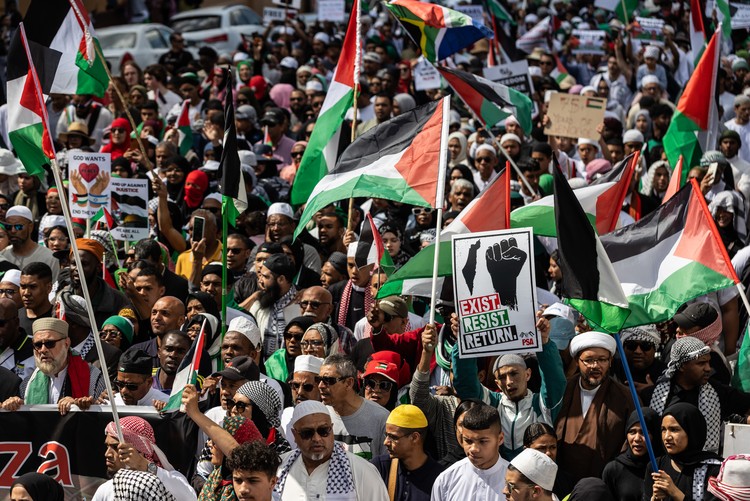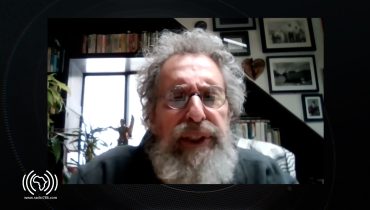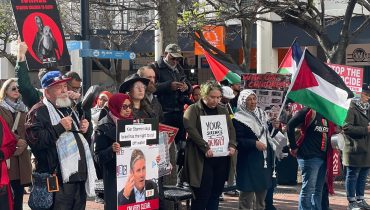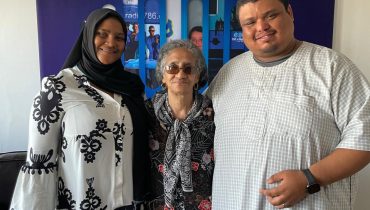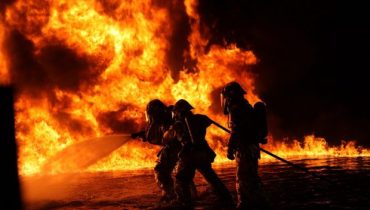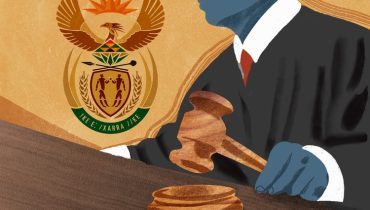- Ran Greenstein is an associate Professor and lecturer in Sociology at the University of Witwatersrand.
This article looks at some of the ways in which issues of indigeneity, resistance, and history were tackled in debates surrounding the events of October 2023 and follow-up developments in Israel/Palestine. It examines different perspectives on the Hamas attack and the Israeli military campaign against Gaza, with a focus on the role that notions of historical context, colonial domination, and anti-colonial resistance played in them. However, it does not deal directly with the military offensive itself and regards it as rather a background to intellectual and activist attempts to understand these developments in their context. These attempts mostly fall on the left side of the spectrum; mainstream Israeli and Palestinian perspectives are not addressed here. The article is not meant to cover all points of view but to highlight those that share some common foundation in progressive politics, despite their differences.
The Hamas attack on the 7th October 2023 and its aftermath are used here as a starting point for the discussion, not because the armed conflict began on that day but because the current round of debate has focused on the historical context that frames these events and the terms that guide us in analyzing them. In particular, the question of how to look at the conflict – as a case of clashing nationalisms, colonialism and resistance, settler violence and indigenous response, or a combination of the above – is addressed through a review of some perspectives that informed current debates engaged by different groups of activists and intellectuals.
I argue that we need to focus on both nationalism and colonialism in making sense of the current Gaza war and its historical context. Anti-colonial resistance is central to the analyses and debates that have followed these events, but the notion of indigeneity – as understood in recent academic discourses, especially in the Western Hemisphere, to include not only prior residence in a particular location, but also distinctive attitudes towards land, nature and the environment, cosmology, power and identity, knowledge production, inter-personal and communal relationships – has played a very limited role.
In other words, looking at Israel/Palestine through a colonial framework of analysis does not mean the adoption of indigeneity, in the specific sense above, as an essential concept. This is not to deny, of course, that Palestinian Arabs were indigenous to the country, having formed more than 90% of the population when the Zionist movement began its settlement project in the late 19th century. But, their struggle for independence and sovereignty has rested on the modern notions of democratic representation and national self-determination that apply to all groups in principle, and not on claims to any special indigenous civilizational, cosmological, and ecological status as compared to Israeli-Jewish settlers and co-residents of the country.
On the same day that the Islamic militant movement Hamas launched a large-scale attack on Israeli military bases and border communities in October 2023, Palestine Solidarity groups at Harvard University released a statement about the attack. The precise circumstances were not clear yet, and the number of casualties was not known at the time, but the students’ statement showed no hesitation in holding Israel “entirely responsible for all the unfolding violence”. That violence was derived from the context of two decades of siege on Gaza, the statement said, and a long history preceding that: “The apartheid regime is the only one to blame. Israeli violence has structured every aspect of Palestinian existence for 75 years”. The statement ended with a call for “a firm stand against colonial retaliation” and for “action to stop the ongoing annihilation of Palestinians”.
In essence, this reaction to the events and their anticipated aftermath saw them as a violent response to decades of violent Israeli oppression framed in colonial and apartheid terms, of Gaza in particular and Palestinians in general. This situation went back all the way to 1948 – the year of Israel’s independence and the ethnic cleansing of Palestine known as the Nakba.
In a similar vein, a statement by the Democratic Socialists of America (DSA) on the same day, titled “End the Violence, End the Occupation, Free Palestine”, considered the events as “a direct result of Israel’s apartheid regime”. Unlike the Harvard students who mentioned only Palestinian casualties and ignored Israeli civilians, the DSA condemned “the killing of all civilians” but without specifying who they were. It noted a similar context to that of the Harvard statement: “the Israeli state has systematically denied Palestinians the right to self- determination for decades … For over 60 years, Palestinians have faced ethnic cleansing, torture, bombings, and housing demolitions. Gaza is still under a blockade”.
These early responses were gut reactions by activists who did not or could not present an in- depth discussion of the issues involved, but within less than a week more nuanced reflections from the same general direction were offered by Berkeley academic Judith Butler. She started by condemning ‘without qualification’ the violence committed by Hamas as “a terrifying and revolting massacre” and continued with a criticism of those who deployed the history of Israeli violence in order to excuse Hamas, using in the process “a corrupt form of moral reasoning to accomplish that goal”. Israeli violence against Palestinians was overwhelming and it was waged against people subject to “apartheid rules, colonial rule and statelessness”. But, Butler continued, it was wrong to blame the Israeli regime alone: “nothing should exonerate Hamas from responsibility for the hideous killings they have perpetrated”. Doing that denied Palestinians their agency and prevented people from recognizing that there were different ways to fight colonial rule. It was crucial to understand the past though, to debate whether the Israeli regime was “racial apartheid or colonialism”, and to develop a new political morality.
Condemning Hamas was not enough to bring an end to violence, however. To achieve that, there was a need to understand that Hamas grew out of the failure of the Oslo peace process of the 1990s to deliver on its promises. Overall, Hamas fitted within Palestinian history and aspirations for “freedom and the right of political self-determination, for release from colonial rule and pervasive military and carceral violence”. Such contextualization was essential, Butler said, not in order to shift blame or to exonerate perpetrators of violence, as the Harvard students had done, but to place “the horrors of the last days” in a context of “radical injustices” endured by occupied Palestine and Palestinians – as well as “the humanitarian disaster and loss of life happening at this moment in Gaza”.
The terms used for the contextualization were important: was it a ‘war’ between two equal parties, a national conflict, or a colonial-type situation? Was Gaza ‘under occupation’ or an ‘open-air prison’? Choices made in this regard were a matter of political perspective and of identity too. Butler wrote: “I am also a Jew who lives with transgenerational trauma in the wake of atrocities committed against people like me. But they were also committed against people not like me. I do not have to identify with this face or that name in order to name the atrocity I see. Or, at least, I struggle not to”. Of particular concern was the language used by Israeli and American officials, which evoked notions of bestiality and savagery: “this is surely not the first time that a group of people seeking release from colonial shackles has been figured as animals by the coloniser”. This framing reinforced “the colonial opposition between the ‘civilised ones’ and the ‘animals’ who must be routed or destroyed”, in order to save civilization.
The history of injustice must be considered because “we are right to deplore that violence [by Hamas] and to express our horror”, but we must mourn all lives lost, in Israel and in Gaza, “without getting bogged down in debates about relativism and equivalence”. Learning about “the history of colonial violence” was critical, but “not for the purposes of rationalising existing violence or authorising further violence”. Rather, it was essential for the future: “liberation struggles that practise non-violence help to create the non-violent world in which we all want to live … without equality and justice, without an end to the state violence conducted by a state, Israel, that was itself founded in violence, no future can be imagined, no future of true peace”. Such a future requires opposition to all violence, “including Israeli state violence in all its forms”, without fear of being accused of antisemitism, because supporting Palestinian self-determination was in line with “the deepest desires of all the inhabitants of those lands to live together in freedom, non-violence, equality and justice”.
Butler’s opposition to violence in general and to the Hamas attack in particular was clear, but it did get bogged down precisely in those debates about relativism and equivalence it sought to avoid. On the one hand, condemning all violence as equally unacceptable clashed with the notion that anti-colonial indigenous resistance was justified ‘by any means necessary’. That notion was used by some solidarity activists, but it was rarely expressed explicitly in a written form. Those who saw Hamas’s violence as a response to prior Israeli violence and oppression usually sought to contextualize it politically rather than pass a judgement that violence was morally justified when carried out by indigenous people. On the other hand, progressive Israeli intellectuals took Butler and others like her to task for framing the conflict in explicit colonial terms, thereby implicitly justifying the Hamas attack but not necessarily its tactics.
A couple of days after Butler’s article appeared online on the London Review of Books site, a group of ‘Israel-based academics, thought leaders and progressive activists’ expressed their pain, shock and concern at the response of ‘certain American and European progressives’ (who remained unnamed) to the targeting of Israeli civilians by Hamas. This reflected, they said, “a disturbing trend in the global left’s political culture”, which undermined the struggle “against oppression and violence and in pursuit of full rights and equality for all residents of Israel-Palestine”. The reaction of the global left should have been solidarity and “an unequivocal call against indiscriminate violence towards civilians on both sides”, but many activists reacted rather with “indifference to these horrific events and sometimes even justified Hamas’s actions”. Others refused to condemn the attack, “claiming that outsiders have no right to judge the actions of the oppressed” or argued that Israeli society brought this upon itself. Still others “shielded themselves from the moral shock through historical comparisons and rationalization”. All this was a display of “extreme moral insensitivity and political recklessness”.
For these Israeli intellectuals, it was important to gain support from the global left, a diffuse group that they always regarded themselves as being part of but now felt excluded by it. There was no contradiction, they asserted, between opposition to “Israeli subjugation and occupation of Palestinians” and unequivocal condemnation of “brutal acts of violence against innocent civilians”, regardless of the origins of that violence. A consistent leftist position, they concluded, should adhere to both principles and thus assist local activists in the struggle “to break the cycle of violence and destruction”.
On the face of it, this call was similar to Butler’s but with crucial differences: it mentioned Israeli oppression of Palestinians but did not regard it as the context for the October 2023 events or as the root cause of the overall conflict. Rather, it defined it as part of a ‘cycle’, a notion that implies constant attacks and counter-attacks between two equivalent sides without attributing clear responsibility to a single factor or starting point. And, it condemned Israeli violence but did not see it as ‘colonial’ in nature, in Gaza specifically or in reference to the 1967 occupation or to the situation since 1948.
Of particular interest here is the notion that historical comparisons and rationalizations were problematic. This was a reference to the argument that the Hamas attack must be seen in its historical context. Contextualization is an essential operation for any social and historical enquiry, of course, as signatories to the statement know well. But in this case, mentions of context were taken by them to mean attempts at mitigation if not condonation of crimes committed against Israeli civilians on the border with Gaza. Calls to lament civilian casualties that did not explicitly mention the Israeli victims of Hamas were regarded in the same light.
This approach applied to a letter issued shortly after the Israeli statement by ‘the Arts Community’, signed by many thousands (including Judith Butler), which asserted support for Palestinian liberation and for “an end to the killing and harming of all civilians, an immediate ceasefire, the passage of humanitarian aid into Gaza, and the end of the complicity of our governing bodies in grave human rights violations and war crimes”. Referring to the Israeli offensive as an unfolding genocide, the signatories rejected “violence against all civilians, regardless of their identity” and called for “ending the root cause of violence: oppression, and the occupation”. Three aspects here were bound to arouse criticism by the Israelis who had signed the earlier statement: that there was no specific mention of Israeli civilians killed on 7th October; that the root cause of violence, human rights violations, and war crimes was attributed in its entirety to Israel, its oppression and occupation; that the letter was framed as support for Palestinian liberation rather than in more universal terms that would promote peace and justice for all sides. The Arts Community letter clearly was an active political intervention on the side of the oppressed rather than a general expression of support for non-controversial principles. That the authors of the letter added days later – in response to criticism that they ignored “the bloodiest day in Jewish history since the Holocaust” – their “revulsion at the horrific massacres of 1400 people in Israel conducted by Hamas” and called for the release of hostages taken on that day, did not really help matters as far as most Israelis were concerned.
Two prominent intellectuals who signed the Israeli statement expressed concern with this way of looking at the situation. Hebrew University historian Yuval Noah Harari accused the radical left of pursuing “some fixed vision of justice” that led to alignments with “very brutal movements and regimes” (Stalin in the past, Hamas in the present), based on the “belief or fantasy that absolute justice is possible [where] one side is absolutely to blame for everything, including the crimes of the other side”. But reality was more complex, Harari said: “the same people can be victims and perpetrators at the same time. In most conflicts the blame for crimes and atrocities is not shared 100% but somewhere in between”. Failing to see that harmed the cause to which the left was nominally committed, he concluded.
Much harsher was the verdict of sociologist Eva Illouz of the same institution, who claimed to have joined the ranks of the Palestinian struggle against Israeli government policies but then became disillusioned with the response of the global left to the atrocities and war crimes committed by Hamas: “A good part of the international left – which has for two centuries defended equality, freedom, and dignity – either celebrated news of the massacre as an uprising against colonizers or dismissed it with embarrassing intellectual strategies. The left scoffed, deserted, ignored, and marked with the mark of Cain vulnerable Jews all over the world”. Harvard students led the way, she said, and “the reaction of universities, intellectuals, and artists worldwide repeated the same position with a dull uniformity. Israel was the real and only culprit”.
The problem for Illouz was the attempt to look at events in context while in reality narratives coexisted in a state of tension and even clash: “there are several, intersecting narratives interpreted simultaneously without any strong or circumstantial connection at all. We have, for example, an ugly colonial struggle taking place between Jews and the native Arab Palestinians for the past century, and, alongside it, the genocidal intent of Hamas, a branch of the Muslim Brotherhood, which has developed a rabid antisemitism and brutalizes its own Palestinian population”. These narratives opposed each other, rather than provided a single integrated story or two mirroring narratives, which is why we could condemn the 7th October massacre and support Palestinian independence at the same time. The ‘there’s a context’ strategy was lazy, she argued, “because it doesn’t envision the possibility that narratives may be severed from one another, that one does not explain the other”.
In fact, Illouz rejected the logic of historical contextualization altogether by flipping it on its head. She asked: should we invoke “the context of murderous antisemitism, which has given rise to Zionism, thereby making it drastically different from all forms of settler colonialism? Should we include in our contextualization the fact that the Jerusalem mufti Amin Al- Husseini supported the Nazis and their Final Solution and that, as such, losing Palestine was a part of the redrawing of maps after World War II?” Her answer was an emphatic ‘no’. The Palestinian loss and Israelis’ pain must be appreciated in their own terms, and for that we need to suspend the context, not counterpose the narratives or explain one through the other.
It must be admitted that there is a valid point here, not because the context can be suspended – that is neither feasible nor desirable – but because the questions of who determines the boundaries of the context in time and space, and how, have no obvious answers. There is more than one relevant context that shapes the meanings people attach to historical events, and within which they decide how to act. Choosing the context is a matter of political commitment as much as it is driven by social positioning and personal identification. Contexts are not mutually exclusive, but they call for different emphases. And, once an event takes place it modifies the context further for any subsequent developments.
For Palestinians and their global allies, the context that explains and (for a few) justifies the 7th October attack is the siege on Gaza imposed by Israel since 2007, seen within the older contexts of the 1967 occupation, constant encroachments on land and rights, dehumanization and shrinking liberties, all the way back to the 1948 Nakba. The majority of Gaza residents trace their origins in the territory to that early period, when their ancestors were forced out of their villages and towns in the southern part of the country during the events that created Israel, fragmented Palestine, and established the parameters of the conflict which remain to this day. That Hamas chose to call its incursion ‘Al-Aqsa Flood’ endows the context with an additional Islamic religious overtone, but that aspect seems of little relevance for external activists.
Many Israelis have been aware of this context, of course. A famous speech by Moshe Dayan, the celebrated military hero known for his brutal honesty, has been invoked over the years in discussions of Gaza. In April 1956, six months before Israel occupied Gaza during the Sinai Campaign (only to withdraw from it in early 1957 and return a decade later), Dayan said in a eulogy for a Kibbutz member who was killed by Palestinians from across the border: “Let us not blame the killers. How can we complain about their deep hatred for us? For eight years they have been sitting in the refugee camps of Gaza, while in front of their eyes we have been transforming the land and villages where they and their ancestors had resided into our own inheritance”. Dayan did not use that insight to challenge Israeli policy, however. On the contrary, he asserted: “We are a generation of settlement, and without the steel helmet and the muzzle of the cannon we would not be able to plant a tree and build a home … This is the fate of our generation. This is the choice of our lives: be ready, armed, strong, and tough; or let the sword drop from our fist, and our lives would be cut down”.
The Palestinian predicament is embedded within a broader context: the global decolonization campaign that saw much of the colonized world gaining political independence at the same time that Palestinians lost control over their homeland. For movements and activists involved in historical anti-colonial campaigns there is a clear link between their own efforts and the Palestinian national struggle. Solidarity with that struggle does not constitute identification with any specific tendency within the movement, such as Hamas, or a necessary endorsement of the tactics it used. Rather, it means looking at the Gaza war as one episode in the long-term struggle between the colonizer and the colonized, the settler and the indigenous, and perhaps also between global white domination and black resistance, and the West and the Rest.
The context for the majority of Israelis is different: it is the historical memory of millennia- long Jewish vulnerability and persecution. The attack on border communities is seen as a link in a long chain of anti-Jewish violence, from medieval blood libels and massacres through the 1903 Kishinev pogrom to the Holocaust, despite the vast differences between conditions in pre-1945 Europe and post-1948 Palestine. That Israel was established three years after the Holocaust, in a move many regarded at the time as redress for the Nazi genocide of the 1940s, reinforces this link. In this view, Israel’s creation was an act of justified compensation even if it came at the expense of non-Jewish residents of the country. From this perspective, opposition to Israel and its right to exist and defend itself (but not all criticisms of its policies) reaffirms the ages-long hatred towards Jews and denial of their rights and perhaps their very existence. Their quest for security thus takes precedence over all other considerations.
There is another context that matters to some Israelis, those of a more liberal-left inclination like the signatories of the October statement above. Reality for them is shaped by a global context governed by the norm of national self-determination, which should apply to Israeli Jews and Palestinian Arabs equally. Both are seen as legitimate national groups that deserve recognition and statehood as promised by the UN partition resolution of 1947. Palestinians have no valid claim on Israeli territory and vice versa. The conflict between these groups can be resolved when an agreement on borders and security arrangements is reached. The Hamas attack violated that norm: invading Israeli territory was an illegitimate act of aggression that could not be justified in the name of the struggle against the 1967 occupation or as part of an anti-colonial campaign.
In this view, Israel’s response was an act of self-defense, provided it was not excessive and did not re-establish permanent control over Gaza. Liberal-left Israelis usually acknowledge the history of Palestinian displacement as a result of Israeli ‘placement’, but they regard that as an outcome of a national-territorial conflict rather than a colonial-existential one. The 1948 Nakba is thus seen as a regrettable but irreversible stage in the conflict, which cannot be undone without causing even worse moral and human catastrophe. The colonial analogy is prevalent though. American author Adam Shatz, quoting Frantz Fanon’s observation in Wretched of the Earth that ‘the colonised person is a persecuted person who constantly dreams of becoming the persecutor’, argues that on 7th October 2023 that dream was realized for Palestinian militants: “finally, the Israelis would feel the helplessness and terror they had known all their lives”. In colonial wars, he quotes Fanon again, ‘good is quite simply what hurts them most’. This is why in many countries that had been subjected to colonial rule, white domination, and apartheid, “the Palestinian struggle for independence, in conditions of grotesque asymmetry, strikes a powerful chord”. Shatz is scathing though of so-called ‘decolonial’ left activists based at Western universities, who consider themselves as following in Fanon’s footsteps by praising or condoning the Hamas violence as a form of anti-colonial justice. He puts it thus: ‘Decolonisation is not a metaphor’, “the groupies of Al-Aqsa Flood intoned”.
Having just completed a highly-regarded intellectual biography of Fanon, Shatz argues that Fanon looked at murderous forms of anti-colonial violence as a psychiatrist who diagnosed “a vengeful pathology formed under colonial oppression”, rather than as an activist who offered a prescription for political action: “evoking the phenomenological experience of anti- colonial fighters, he noted that in the early stage of revolt, ‘life can only materialise from the rotting cadaver of the colonist’.” But Fanon also wrote of the harmful effects of war trauma, including the trauma endured by anti-colonial rebels who killed civilians. For Fanon, Shatz says, anti-colonial fighters in Algeria needed to “overcome the temptations of primordial revenge” and resentment, and embrace all residents: not only Muslims who were “freeing themselves from the yoke of colonial oppression”, but also European settlers and Jews who were willing to join the liberation struggle. But of course, that is neither the Hamas vision, nor that of Western solidarity activists who indulge in the “ethno-tribalist fantasies of the decolonial left, with their Fanon recitations and posters of [Hamas] paragliders”, who were at the forefront of the attack. The price for such rhetorical excess is paid by the people of Gaza.
Shatz concludes on a note that does not equate Israeli colonial oppression with Palestinian anti-colonial liberation but does equate the entitlement of both groups to freedom and justice: “the inescapable truth is that Israel cannot extinguish Palestinian resistance by violence, any more than the Palestinians can win an Algerian-style liberation war: Israeli Jews and Palestinian Arabs are stuck with each other … [potentially saved only by] a political solution that recognises both as equal citizens, and allows them to live in peace and freedom, whether in a single democratic state, two states, or a federation. So long as this solution is avoided, a continuing degradation, and an even greater catastrophe, are all but guaranteed”.
Similar points were made by Canadian public intellectual Naomi Klein, who lamented the fact that “in their desire to celebrate the powerful symbolism of Palestinians escaping the open air prison that is Gaza – which occupied people have every right to do – some of our supposed comrades on the left continue to minimize massacres of Israeli civilians, and in some extreme cases, even seem to celebrate them”. This expression of opposition to Israeli domination was “a gift to militant Zionism”, because it reinforced its core notion that Jews would always be hated and unsafe without their own state and independent power, which must be wielded without restraint to ensure survival at all costs. How could this violent ideology be confronted, she asked. For a start, her answer went, by recognizing that when Israeli Jews were killed in their homes and that was “celebrated by people who claim to be anti-racists and anti-fascists”, that response was experienced as antisemitism by many Jews, and such antisemitism was hateful in itself and also because it was “the rocket fuel of militant Zionism”.
The way out is solidarity, a “humanism that unites people across ethnic and religious lines. Fierce opposition to all forms of identity-based hatred, including antisemitism”. The global left must be grounded in “values that side with the child over the gun every single time, no matter whose gun and no matter whose child. A left that is unshakably morally consistent, and does not mistake that consistency with moral equivalency between occupier and occupied”. In a similar manner to Butler and Shatz, Klein makes a distinction between taking a clear political position in support of Palestinian rights and the liberation struggle against the colonial occupation (in other words, rejecting neutrality in the conflict), and at the same time, adopting a moral position that rejects violence against all civilians regardless of their background. That Israeli Jews may be regarded as settlers in the context of a Palestinian struggle against land dispossession and for freedom from colonial domination does not make their violent killing by armed militants any less of a violation of universal moral and legal principles than if they were indigenous people.
With the passage of time and unfolding of events, the initial impact of the Hamas attack inevitably receded, and the enormity of the brutal Israeli retaliation moved to the forefront of public attention, but not everywhere – it remained as the new context that shaped subsequent events in two key settings: Israel and the USA. In December 2023, Congressional hearings targeted university presidents for their responses to the protests waged by students at elite American universities in solidarity with Palestinians under attack, and the boundaries of freedom of political speech were questioned. The focus was on the slogans raised by some students – ‘there is only one solution, Intifada revolution’, ‘globalize the Intifada’, and ‘from the river to the sea, Palestine will be free’ – all of which were evident in protest events and were presented by right-wing US politicians and Israel supporters as amounting to calls for the elimination of Israel and for a genocide against Jews.
Nothing in these slogans reflects genocidal or antisemitic attitudes, though of course they do express clear political opposition to the State of Israel and its policies. Rejecting Israel’s legitimacy as a Jewish state, referring to it as an apartheid state, regarding it as a colonial imposition on the region, calling it a racist endeavor, or using terms such as genocide and ethnic cleansing to refer to impact of its policies, are controversial and a matter for intense debates. But, similar language can be (and has been) used in whole or part in other situations: against the apartheid regime in South Africa, the Moroccan occupation of Western Sahara, Myanmar’s policies towards the Rohingya, the conflicts in Darfur and South Sudan, the 1994 Rwanda massacre, Turkish repression of Kurds, Chinese policies towards Tibet, Indian policies in Kashmir, the Russian invasion of the Ukraine, and so on. Jews and Israelis are not singled out in this respect.
There is something distinctive about Israel/Palestine though. These names for the country are co-extensive: there is no separate Israel which is distinct from Palestine and vice versa. The terms people choose to use reflect different ethno-cultural histories, identities, and political beliefs, rather than mere geographical realities. The Palestine that is to be free, ‘from the river to the sea’, is the same territory that Jews have referred to historically as the Land of Israel (Eretz Israel), and that is governed today by the State of Israel. In this sense, the slogan is indeed incompatible with the existence of Israel as a Jewish state and perhaps its existence as a state, period. Calling for the freedom of Palestinians (as individuals and as a political community) is a just demand that should not be controversial and is compatible with the freedom of Israeli Jews too. However, calling for the freedom of Palestine (as a territory) can and frequently is interpreted in exclusive ethnic terms as a call for sole control by one group of people. This interpretation is supported by the omission of any mention of Jewish residents of the country and their rights.
This can be contrasted with equivalent slogans of an explicitly inclusive nature raised by the anti-apartheid movement: ‘South Africa belongs to all who live in it, black and white’ in the words of the Freedom Charter of the 1950s, or ‘one person, one vote’ as the main call of the 1980s’ United Democratic Front. The mainstream Palestinian national movement itself called since 1970 for ‘A Secular Democratic Palestine’, in which Muslim, Christian, and Jewish residents will live equally. In this sense, the current solidarity call ‘from the river to the sea’ is a regression towards claiming an exclusionary Palestinian-Arab identity for the country, and a move away from the more inclusive trend that preceded it historically.
The democratic alternative to Jewish domination in apartheid or colonial Israel/Palestine is power sharing, equal rights for all, justice, and redress. This goal can be realized only on the basis of rejection of ethnic and religious privileges that establish the supremacy of one group of people over others. Defining Israel as a Jewish state is a violation of the principle of political equality, of course, but that is also the case for defining Palestine as an Arab or Islamic country. There is nothing progressive about replacing one type of ethnic domination with another, even when such domination is to be exercised by an indigenous movement.
The question of methods of struggle is equally important. The term Intifada is used to refer to the unarmed Palestinian uprising of the late 1980s (retroactively, the first Intifada) as well as the armed uprising of the early 2000s (the second Intifada). It means insurrection, resistance that can be peaceful or violent depending on the circumstances, and may involve popular mobilization but also vanguard actions, conducted with or without weapons, targeting armed opponents or civilians or both without distinction. In itself, it does not mean killing civilians and suicide attacks, or mass killings of anybody. Under no reasonable interpretation does it mean genocide of Jews. But, it could possibly mean – as was the case with Hamas during the second Intifada – attacks against Israeli civilians, seen as legitimate targets, which are in fact war crimes even when those civilians are citizens of a colonial or occupying power.
In reality, the militant slogans used by solidarity activists today play the same symbolic role in student politics as was played in the 1960s and 70s by the images of Ho Chi Minh or Che Guevara, Black Panthers carrying weapons, Angela Davis raising her fist, and Leila Khaled wearing a keffiyeh, armed with an AK47 – showing off your radical credentials with minimal effort and no risk. However, when careless use of language is seen together with the refusal of many petition-signers (academics, artists, cultural activists) to condemn explicitly the Hamas attacks on civilians, or their choice of passive-evasive formulations such as ‘we regret the loss of innocent lives on all sides’ (which sounds like ‘all lives matter’), it is problematic. Not only because it blurs the distinction between legitimate and illegitimate means of struggle, but because it indirectly provides an excuse for retaliatory violence by the more powerful Israeli side. The unprecedented scale and ferocity of the Israeli military response, and the high level of support for it internally, cannot be understood without the triggering impact of the 7th October attack.
Re-introducing notions of colonialism into the discussion in a later contribution, Judith Butler interpreted these slogans as rejection of silence “in the face of colonial violence, an effort to throw off the shackles of colonial rule”. This was not support for genocidal violence; in fact, decolonization would prevent genocide: “if the rage of intifada, however, is directed against colonial rule, then decolonization will more likely produce another emotion: emancipatory joy, a sense of freedom, the release from shackles that have only tightened over the seventy- five years of their imposition”. For violence to end, Butler said, Israeli state violence had to end, a step that would lead to “a new possibility for cohabitation, whether in a one- or two- state solution or another form of governance”. There would be no need for armed struggle “were there not an ongoing and insufferable infliction of state violence by a colonial power against the besieged and dispossessed”. The October attack must not be seen as a starting point, then, “effacing the seventy-five years of occupation, detention, dispossession, and land theft that came before it”.
A few things stand out in Butler’s account: the relevant timeframe is 75 years, which means that the issue is the State of Israel since its inception in 1948, rather than only the occupation of 1967; the notion of reciprocity – violence breeds violence – that refuses to place one side or the other as superior on moral grounds; the notion of equal co-habitation of Israelis and Palestinians, regardless of their historical provenance (indigeneity, immigration, settlement). Butler is not politically neutral, of course, clearly siding with Palestinians as the oppressed and dispossessed who are fighting for freedom from colonial rule. But, they are not granted a different moral standing and their claim to political rights is not elevated above that of Israeli Jews due to their prior residence or indigenous status. Decolonization therefore does not mean here reversal of roles but rather overcoming the boundaries between the indigenous and the settler, treating this distinction as irrelevant for purposes of granting political rights and making future arrangements.
Looking at the Israeli-Palestinian conflict through a colonial analytical framework is one consequence of linking the local and the global, but there are other ways of creating a linkage between these different levels and going beyond them. Israeli scholar Haviva Pedaya argues that the global left ignores the regional dimension (involving broader Middle Eastern alliances beyond Palestine, and conflicts that have nothing to do with the European colonial legacy), and the theological dimension with roots that go back millennia and are currently inserted into a global framework of the rise of radical political Islam as a force pushing for apocalyptic outcomes: “Palestine as a political entity – yes, immediately. Hamas as a global terrorist body featuring crimes against humanity, a discourse of extermination of Israel and harming world Jews – no, under any circumstances”.
The call for globalizing the Intifada introduces a binary division between good and evil and conflates complex local conflicts with simplistic global solutions, Pedaya says. The result is that Jews are being targeted wherever they are, and crimes against humanity are condoned because supposedly “anything done by the insurgent native against colonialism is justified”. She attributes the hostility of leftist intellectuals towards Israel, and implicitly towards Jews, to their guilt feelings about the legacy of Western colonialism, even though the global scene today cannot be understood in terms of the West and the Rest. The eruption of unrelated conflicts in many different locations (the Ukraine, Yemen, Sudan) has disrupted standard dichotomies long used by Intellectuals. That reactionary Islamic zealots and progressive Western leftists could coalesce around the same political program regarding Israel/Palestine means that the old certainties that shaped the universalist left agenda are no longer valid, Pedaya maintains.
This is not to deny the realities of occupation and colonial practices as features of Israeli policies towards Palestinians, and the human catastrophe caused by the ongoing Gaza War that may lead to genocide. Rather, Pedaya argues, it is to insert these realities into a context that goes beyond the 20th century indigenous/colonial divide in order to include other crucial developments: the breakdown of the global order, tribal wars, the spread of epidemics, the rise of murderous Islamic fanaticism, and the re-emergence of global antisemitism. Pedaya takes Butler to task for adhering to obsolete binary notions of oppressors and oppressed seen in a one-dimensional manner. She calls on critical intellectuals “to formulate new paradigms that account for changing global conditions”, and reject “the discourse of religious zealotry, annihilation and revenge, a discourse that creates symbolic enemies that must be destroyed, a discourse the negates the existence of Israel, or seeks revenge for Gaza, or identifies Palestine with Hamas in order to block a political solution”.
If the world were indeed multi-dimensional as Pedaya argues, rife with conflicts that do not cohere along a single line of division, then the settler/indigenous distinction can no longer function as the core principle of moral and political demarcation, separating people and regimes clearly into right and wrong sides. Solidarity then would become a complex notion with no easy choice of actors with whom to identify. Within such broader regional and global contexts, indigeneity is not straightforward: millions of Israeli Jews may not be indigenous to the country in the same way Palestinian-Arabs are but they and their ancestors are indigenous to the Middle east and North Africa (MENA) region, as the examples of Pedaya herself (her parents were born in Iraq) and the Moroccan-born Illouz illustrate. While such origins cannot be used to deny the oppressive nature of Israeli rule over Palestinians, they do challenge the framing of Israeli domination in terms derived solely from European colonial history.
Further rejection of binary thinking is provided by Shatz, after the publication of his book, offering reflections on Fanon’s possible reaction to current trendy approaches such as Afro- pessimism or decoloniality, which replace history with ontology: “Instead of seeing these [racial, colonial] identities as products of history and as entities that can be unmade, they view them as fixed and essential. Thus, the person who is the child, the grandchild or the great-grandchild of a colonized nation is somehow eternally colonized. Right? The notion is that anti-Black oppression is something that can never be transformed; it’s simply an irreducible, ontological part of societies under Western domination”. Shatz adds: “I think Fanon was very skeptical of this style of thought – which, by the way, has a lot in common with Zionism … [for which] a Jew in exile is living in a kind of hell, where it’s always possibly 1939”. Of course, Fanon saw anti-colonial violence as the inevitable outcome of colonial violence, but understanding the historical source of action is not the same as justifying it or regarding it as morally and politically legitimate, even if the distinction may not always be drawn clearly.
This ambiguity between analysis and justification, between morality and politics, became evident when Judith Butler said more recently: “It is more honest and historically correct to say that the uprising of October 7th was an act of armed resistance. It is not a terrorist attack and it’s not an antisemitic attack. It was an attack against Israelis…I did not like that attack…It was anguishing, it was terrible. However, I would be very foolish if I then decided that the only violence in the scene was the violence done to Israeli people. The violence done to Palestinians has been happening for decades. This was an uprising that comes out, that comes from, a state of subjugation and against a violent state apparatus”.
Regardless of precise wording, Butler’s point is that the violence that Hamas inflicted on civilians on 7th October came in reaction to Israeli state violence. In that sense, it was neither a terrorist attack (which targets civilians at random) nor an antisemitic attack (which targets Jews at random). Calling it ‘an act of armed resistance’ means it was undertaken as part of a political struggle in historical circumstances that provide a necessary context for the events.
Of course, calling the attack ‘armed resistance’ does not constitute support for it, let alone for any specific acts undertaken in the course of the overall campaign, such as instances of sexual violence. Butler was not saying anything explicit in support of such acts, obviously, but in France, where she was speaking, the term Résistance is clearly associated with opposition to the Nazi occupation and therefore has an undisputed positive connotation. Further, her insistence on seeing ‘documentation’ that proves rapes were committed in the course of the attack before condemning them, provided critics with additional ammunition for the accusation that she was acting as an apologist for Hamas.
Curiously, just as Butler became the bête noire of Israeli liberals for not empathizing enough with their anguish in her criticism of Israeli policies, she was attacked by a fellow US-based academic for being too critical of Palestinians and their leaders. Jodi Dean of Hobart and William Smith Colleges called for an explicit support for Hamas as the vanguard of global anti-imperialist resistance. Instead of placing the Nakba and resistance at the center of analysis, Dean said, Butler criticized Harvard students and thus displaced attention “from the reality of genocidal violence in Gaza and onto the affective environment of safe and privileged US universities”. By insisting on “equal grievability and rights to mourn”, as well as calling for new forms of politics that excluded Hamas, Butler focused on violence regardless of its origins and aims. This means, Dean said, that “the liberation struggle of a colonized, occupied, and oppressed people is ruled out in advance”. But, she added, Hamas was the leader of the struggle for a free Palestine, and thus was essential to a united front of resistance to imperialism. Oppressed people fought against their oppressors by any means necessary. They chose the strategies and tactics they needed in order to win. Those in solidarity with their struggle must make a clear decision: “there are two sides and no alternative, no negotiation of the relation between oppressor and oppressed”, she concluded.
Dean, of course, is no less part of the safe environment of privileged US institutions than Butler and the Harvard students, though her perspective of explicit support for Hamas is rare among her colleagues. It is notable that she formulates such support as part of a global anti- imperialist front (whatever that means under conditions of disparate struggles that do not and cannot cohere around a single axis), and the uprising of an oppressed group, while the notion of their specific rights as an indigenous group native to the territory is relegated to the margins in her comments. Palestinians are fighting indeed for their freedom from oppression and deserve support from the left, but that Israelis are foreign ‘settlers’ is not an issue that seems to require specific attention. They are rightly condemned for denying independence to their subjects, but the presence or absence of indigeneity is not an issue in itself in much of the discourse of the left, including the contribution by Dean. How does this issue feature in Hamas’s own perspective, however, is a crucial question.
In a document published by the movement’s media office three months after the beginning of the war, the only instance to date in which it has outlined its position in writing in a comprehensive manner, the 7th October operation is discussed against a long historical background, from 1918 when the British established their rule over the territory of Palestine. At that time, the document asserts, over 90% of the population were Palestinians who held most of the land. During the following 30 years, by the end of the British Mandate, “the Jews, who were brought to Palestine in mass immigration campaigns in coordination between the British colonial authorities and the Zionist Movement”, had acquired more land and had grown to become over 30% of the population. When Israel was established in 1948, “the Zionist gangs engaged in an ethnic cleansing campaign against the Palestinian people aimed at expelling them from their lands and areas”. As a result, they seized control of 77% of the land, expelled 57% of ‘the people of Palestine’, and destroyed over 500 Palestinian villages and towns. In 1967 they finished taking over the rest of Palestine.
It is clear that the terms ‘Palestinians’ and ‘the people of Palestine’ here refer to Muslim and Christian residents only, and not to Jews (whether they had arrived in the country as part of the Zionist settlement project or at any time before that, regardless of circumstances). This can be read as a rejection of any Jewish presence in the country. The document also lists a series of more specific issues: “75 years of relentless occupation and suffering” (since the 1948 Nakba), the 1967 occupation and Jewish settlement activities in the West Bank, the 2007 siege on Gaza, and more recent provocative actions in relation to the al-Aqsa mosque in Jerusalem. Against this background, the 7th October operation was “a necessary step and a normal response to confront all Israeli conspiracies against the Palestinian people and their cause. It was a defensive act in the frame of getting rid of the Israeli occupation, reclaiming the Palestinian rights and on the way for liberation and independence like all peoples around the world did”. It took place in the context of many cases of “struggle against colonialism and occupation … [that show] that in the same level of oppression committed by the occupier, there would be an equivalent response by the people under occupation”.
Hamas claims it does not wage “a struggle against the Jews because they are Jewish but wages a struggle against the Zionists who occupy Palestine”. It is the Zionists rather “who constantly identify Judaism and the Jews with their own colonial project and illegal entity”. What this says about Israeli Jews, most of whom identify with Zionism as their national movement, is not clear. Hamas regards itself as a national liberation movement that derives legitimacy from the right to “self-defense, liberation and self-determination”, and whose struggle takes place in “the occupied Palestinian territory” in line with international law and UN resolutions. It ends its ‘narrative’ with a call for “keeping the popular pressure around the world until ending the occupation”, and “standing against the normalization attempts with the Israeli entity and for a comprehensive boycott to the Israeli occupation and its backers”.
Three things in particular are important to note here. First, Hamas asserts that Palestinians are native to Palestine and that Jews/Zionists are not. But, they derive the right to resist and to claim their freedom and independence not from their specific status as indigenous people but from the universal notions of national self-determination and freedom from foreign rule. These notions apply in anti-colonial struggles but also in settings where all sides are equally indigenous to the land (such as the Yugoslavian conflicts, Ukraine/Russia, India/Kashmir, Sudan, and so on). Indigeneity does not play a specific role in that. This approach is not new: it was central to the Palestinian national movement’s strategy since its inception. Palestinians claimed the land as theirs, and regarded Jewish settlers as a foreign imposition, but did not claim special status as indigenous people. On the contrary, their main demand was to be treated like others in the region – Egyptians, Iraqis, Syrians, Lebanese – who were granted political independence after the First World War, following brief periods of living under British and French Mandatory rule, in accordance with international norms of national self- determination.
Second, they provide justification for their specific tactics of resistance by focusing on the political and tactical circumstances of the struggle, not by using easy but vacuous slogans such as ‘by any means necessary’ that provide blanket immunity from criticism. They make claims that may be contested factually, about targeting Israeli armed personnel only and sparing civilians. But, they do not invoke any special exemption for their actions as anti- colonial fighters in this regard, as could possibly be derived from a Fanonite reading of the situation, a reading that Shatz rejects but many others consider as legitimate. The shadow of Fanon is evident though when they present their actions as a response equivalent to the oppression experienced under the occupation.
Third, they keep the boundaries of their central target – ‘the occupation’ – deliberately vague: is it a reference to Israeli control over Gaza, or more broadly to the 1967 occupation of the West Bank and Gaza, or even further to Israel since 1948? The text allows all these possible interpretations to co-exist, most likely deliberately so as to accommodate different readings: ‘from the river to the sea’ is not a notion that is found here because it projects a flat view of the situation with one simple definition and one simple solution. The official position of Hamas in this regard, which predates the current stage of the conflict by several years, is worth quoting: “Hamas rejects any alternative to the full and complete liberation of Palestine, from the river to the sea. However, without compromising its rejection of the Zionist entity and without relinquishing any Palestinian rights, Hamas considers the establishment of a fully sovereign and independent Palestinian state, with Jerusalem as its capital along the lines of the 4th of June 1967, with the return of the refugees and the displaced to their homes from which they were expelled, to be a formula of national consensus”.
Perhaps unsurprisingly, in all these respects the rhetoric of Hamas (at least when they address the international community in English) is more subtle than that of radical protesters at US universities. The ambiguity of the boundaries of ‘the occupation’ parallels the distinction between colonial and nationalist definitions of the conflict. The Israeli liberal-left, which regards the conflict as a clash between two national movements, accepts the need for bringing the 1967 occupation to an end, but rejects the notion that the legacy of 1948 (the creation of Israel, the fragmentation of historical Palestine, the Nakba) should be reversed through anti- colonial struggle targeting Israel as a whole, which most Israeli Jews regard as an existential threat. As Harari puts it, “every time demonstrators in London or New York chant ‘From the river to the sea, Palestine will be free’, Israelis conclude that ‘they really do want to exterminate us’ … Ideally, each side should give up its fantasy of getting rid of the other”. A peaceful solution to the conflict is technically feasible, he argues, given that there is enough land between the River and Sea to build houses, schools, roads and hospitals for everyone, “but it can be realised only if each side can honestly say that, even if it had unlimited power and zero restrictions, it would not wish to expel the other”.
The problem with this liberal perspective is that without explicitly tackling the colonial legacy, in particular the 1948 Nakba and the persistent campaigns of ethnic cleansing ever since, which became known as the ‘ongoing Nakba’ and have intensified since October 2023, no such harmonious outcome is likely. The political balance Harari seeks to strike between two legitimate movements ignores the lopsided impact of one on the other, and the centrality of land dispossession and demographic engineering to the formation of relations between the groups. As prominent Palestinian-American historian Rashid Khalidi says: we are living now in the last stage in a century-long development, “a multi-stage war” waged on Palestinians by “great power patrons of the Zionist movement – a movement that was both settler colonialist and nationalist, and which aimed to replace the Palestinian people in their ancestral homeland”. He adds that throughout this century-long history, “the Palestinians have fiercely resisted the usurpation of their country”.
Khalidi reaches pessimistic conclusions from the current events: “Hamas’s philosophy of armed resistance is unlikely to disappear as long as there is no prospect of an end to military occupation, colonisation and oppression of the Palestinian people, or of a political horizon promising true Palestinian self-determination and equality. Thus, an upheaval that might have been a catalyst of change may in fact produce continuity of colonisation and occupation, of the Israeli establishment’s exclusive reliance on force, and of armed Palestinian resistance”. Talk of a ‘two-state solution’ by US and European leaders remains hollow rhetoric. The current military campaign reflects “the underlying lineaments of previous ones in this 100 years’ war”, but its intensity is unique, “and it has created deep new traumas”. No end to the carnage is in sight: “we seem to be further than ever from a lasting and sustainable resolution, one based on dismantling structures of oppression and supremacy, and on justice, completely equal rights and mutual recognition”.
Khalidi combines an emphasis on the indigenous/settler colonial divide when accounting for the history of the conflict, but less so when it comes to the solution, which is phrased in terms of mutuality and equality, but also redress. How to redress the legacy of ethnic cleansing, occupation, dispossession, and oppression is not obvious, however, especially now when the immediate horrors of Gaza overwhelm any attempt to look at the overall situation. Regarding the Nakba – the single most important formative event – options range from mere symbolic recognition (along the lines of the ‘land acknowledgements’ that have become popular in Australia and Canada and also increasingly the USA), which clearly would be insufficient, to implementation of the refugees’ Right of Return, which has no chance of gaining traction in Israel and has very limited support globally beyond token gestures.
Palestinians adopt a colonial definition of the conflict, and seek redress, but they see themselves primarily in nationalist terms. Their status as indigenous people is real, of course, but it is not central to their discourses of identity and resistance, which are focused on the quest for freedom from oppression and – right now – sheer survival. Those aspects of the situation that move the definition beyond a ‘normal’ national-type conflict over power and territory can potentially be handled over time in a staggered manner. The solution need not be formulated in an ‘all or nothing’ terms. The point is that raising the issues of colonialism, settlement, and land, is a crucial first step, even if a thousand miles remain for the journey to reach its destination.
The key question then is how to reconcile an analytical focus on colonialism and its legacies, which is essential for an understanding of the conflict on all its dimensions, and a political focus on nationalism, which is essential for beginning to make progress on a practical solution for it. We need both. In the debate over the Gaza war and solidarity, the Israeli participants tend to see only the national dimension, and solidarity activists tend to see only the colonial dimension. An integrated approach, such as Khalidi’s, may emphasize one or the other of these at different times for different purposes, but it must keep both of them constantly at play in an attempt at a balance that may never be reached to the satisfaction of all sides.


